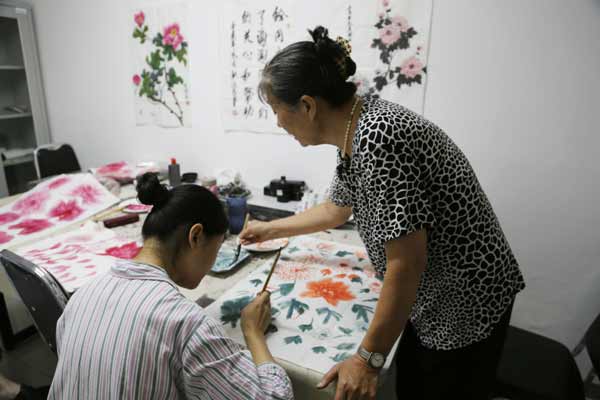Medicine for the mind
 |
|
[Photo/China Daily] |
However, not everybody is fit to work with such patients, Li says. The hospital's management decided to permit Tian's group to volunteer because they believed the group's diverse skill set would aid in the recovery process.
Tian's volunteer group is composed of more than 30 members, most of whom are over the age of 60.
When the program began, some of the doctors and nurses refused to believe that their patients would one day become capable of painting anything, let alone peonies, a subject that requires delicate use of brush and change of color.
Jia managed to teach her students the skill, although it was not an easy process.
"You need a lot of patience when you teach them how to paint. They are prone to forget things and sometimes their hands are not agile enough to command complicated curves as a side effect of drug therapy," Jia says.
"But you cannot get frustrated or angry with them. Your only choice is to help them start from the very beginning if they forget what they have previously learned."
You Guifang, who teaches dance, has had similar problems. Dance requires nimble movements, but some patients cannot respond to the rhythms accurately. The 67-year-old You sometimes has to bend down to help move their feet with her hands.
However, Jia and You are aware that they are not making artists or dancers.
"We are interacting with them to make them feel happy and help them learn to communicate with others," Jia says.
For Bao Fulan, participating in the voluntary program requires not only a good heart and patience, but also courage.
When Tian invited the 72-year-old woman to teach handicrafts at the hospital, her family members and friends warned her that the patients might be unpredictable or dangerous.
She admits that she was initially scared about the prospect of spending time with the patients, but agreed to give it a shot, finding the experience was nothing like what her relatives warned her about.
"Before I came here, I thought the patients were madmen, as I was told when I was a child. But I have found that they are very polite and gentle, much like children, and need care from others," Bao says.
The hospital uses strict measures and the volunteers receive training when they start working with the program to ensure the safety of everyone involved.
Bao and her volunteers keep a close eye on the scissors and tweezers that are frequently used in the handicraft that she teaches. Three doctors and nurses are also on hand when the courses are taught.
Bao's initial worries were not unfounded. Violent attacks carried out by people with mental disorders happen every year. Last month, a mentally ill man attacked bystanders with a knife at a Beijing supermarket, killing one person and injuring three others.
For more China Face, here















